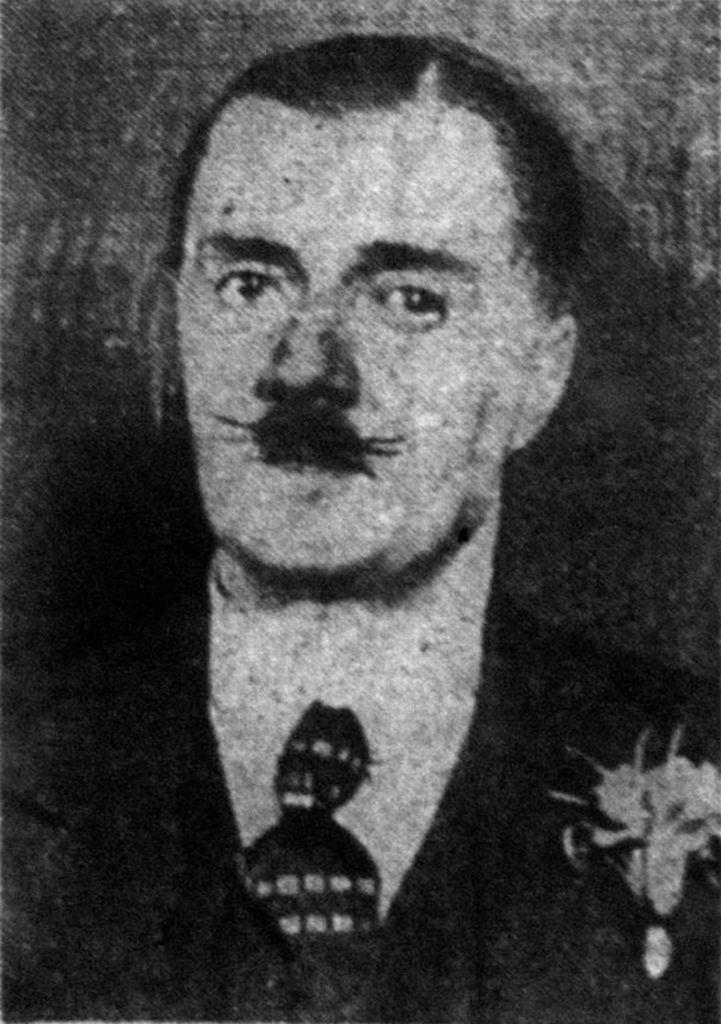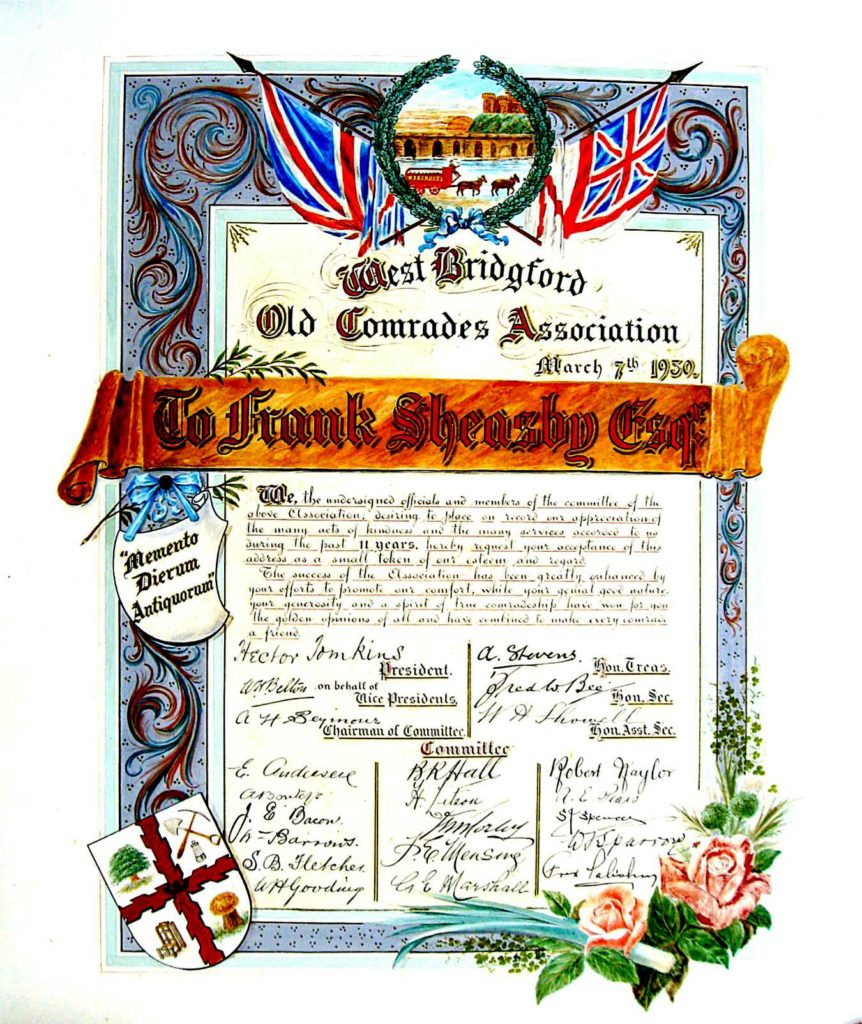
Frank Sheasby entered the world in Reading on 5 February 1885 as Frank Malcolm Vernon Tyler.
By the time of the 1891 census, the family were living in Oxford, where Frank’s father worked as a railway checker. Also in the house was a lodger, Frank Sheasby. Ten years later, Frank’s father was no longer with the family but the lodger still was, and Frank’s mother and her children were all using the surname Sheasby. At this time they were living in Manchester, where the former lodger had become a railway guard.
On 26 November 1905, there was another adjustment of Frank’s name as the marriage was solemnized between Malcolm Frank Vernon Tyler Sheasby and Lilian Kelly. Frank’s occupation was given as waiter. Then, at the 1911 census, the railway connection reappears and Frank’s occupation was given as dining car attendant.
Frank subsequently became manager of Ye Olde Whyte Swanne Inn in Leicester’s market place. It was from here that he enlisted in the army and became a driver in the motor transport section of the Army Service Corps during World War 1. He was mobilized on 14 September 1916, eventually spending 12 February 1918 to 15 January 1919 in France. He was demobilized on 12 February 1919, having reached the rank of sergeant. While he was in the army, it would appear that his wife continued as landlord of the inn.
The following year, 1920, he became landlord of the Trent Bridge Inn in West Bridgford, adjacent to the Trent Bridge Cricket Ground. He was soon advertising for live-in staff:i “Relief Barmaid Wanted, also Kitchenmaid, also smart Youth to make himself generally useful, all to live in, good references required. Apply Frank Sheasby, Trent Bridge Hotel, Nottingham.”
During his time at the Trent Bridge Inn, in 1927, Frank fitted out a lounge on the first floor:ii “It is panelled in walnut and the electric light, which is diffused through hanging bowls of marble, falls on artistic wicker furniture and tables topped with plate glass. The most popular item in the room probably is the very fine cabinet gramophone which stands on a platform at one end and gives forth on request a ‘concord of sweet sounds.’” Only the panelling has survived to the present day.
Frank had suffered ill-health for some time and decided to leave the Trent Bridge Inn in 1930 and take up the post of manager of the Arboretum Hotel in Derby. Speaking as he was about to leave the Trent Bridge Inn, Frank recalled some of his cricket memories.iii
“I remember when I came here from Leicester in 1920 the crowd broke into the ground to see Surrey v. Notts. I shall never forget it. Sometimes I dream that I am still supervising the removal of thousands of bottles from around the stands.”
The following year C G Macartney made 345 against Notts and Frank observed, “That was record cricket and record eating and drinking. Apparently Macartney gave our supporters a terrible thirst.”
However Frank’s most vivid memory was of the 1926 Test, “which was to put it mildly – a wash out. I had catered for an enormous crowd, and was left with thousands of sandwiches and thousands of cobs and cheese in my store.” The left over food went to the poor children of Nottingham.
Before Frank left the Trent Bridge Inn, “he was paid a sterling tribute by members of the West Bridgford Old Comrades’ Association. It took the form of an illuminated address, and bore the signatures of officials.”iv The certificate stated that: “The success of the Association has been greatly enhanced by your efforts to promote our comfort, while your genial good nature, your generosity and a spirit of true comradeship have won for you the golden opinions of all and have combined to make every comrade a friend.” [The image of the certificate is reproduced by the kind permission of Colin Gillespie.]

The original title of the Association was the 11th (Volunteer) Battalion Sherwood Foresters West Bridgford Old Comrades’ Association “A” Company. The Association was said to be the only War Volunteers’ O.C.A. in the country.v At its eleventh annual meeting in March 1930, held as usual at the Trent Bridge Inn, the Association had a membership of 301, an increase of 53 during the year. About 150 attended the meeting, during which it was remarked that “West Bridgford was one of the first places to start the volunteer movement”.vi
The Association held an annual meeting each year and paraded for the annual war memorial services. In 1928, they had been amongst those who lined Radcliffe Road in West Bridgford when the King and Queen visited Nottingham.vii With the threat of another war on the horizon, the West Bridgford Old Comrades’ Association was to experience a new lease of life. At its annual meeting in April 1937, the secretary reported that “last year hundreds of members’ subscriptions had been in arrears, but now they had a really live membership.”viii During the year 34 new members had enrolled and membership now stood at 328. As well as social events, members had been participating in the air raid precaution scheme.
The photograph at the top of this page was taken in 1930 before his departure.ix Frank’s last day as manager of the Trent Bridge Inn was 31 March 1930.
Frank went to become manager of the Arboretum Hotel in Derby, but died less than three months later. His wife, Lilian, retained the hotel licence there until November 1932.x
References:
i Nottingham Evening Post 7 May 1920
ii Nottingham Journal 30 June 1927
iii Nottingham Journal 17 February 1930
iv </aNottingham Journal 5 June 1930
v Nottingham Evening Post 8 February 1926
vi Nottingham Journal 8 February 1930
vii Nottingham Journal 28 May 1928
viii Nottingham Evening Post 7 April 1937
ix Nottingham Journal 17 February 1930
x Derby Daily Telegraph 8 November 1932
